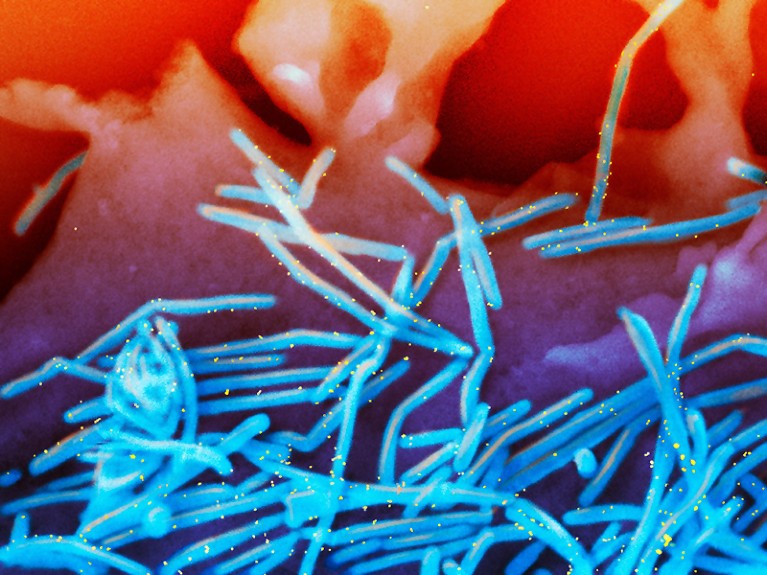Will a new wave of RSV vaccines stop the dangerous virus? - Nature.com

Respiratory syncytial virus infects the lungs where it can cause serious illness in very young and very old people.Credit: NIAID/NIH/SPL
Last week, the pharmaceutical company Moderna announced promising results from a trial of over-60s for its vaccine against a potentially fatal disease: respiratory syncytial virus (RSV). The pharmaceutical companies Pfizer and GSK announced similar Phase III results for this age group last year — both are now awaiting regulatory approval. Pfizer has also filed for approval to give its vaccine during pregnancy, following results showing that it protected newborn babies against RSV. Assuming they will be approved soon, what is likely to be the impact of these first RSV vaccines?
RSV usually causes mild cold-like symptoms, but can be dangerous in very young and very old people. Cases have soared in recent months, putting stress on health-care systems. In babies aged between around one month and one year, RSV is globally the second-highest cause of death, behind malaria. For adults, the data are sparser: a study1 in 2022 estimated that around 6,500 people in the United States die of RSV annually, with the highest rates in people over 65.
But the products being developed for each age group present different opportunities and challenges. "The RSV vaccine field is not one field but two," says Louis Bont, a paediatrician specializing in infectious disease at the University Medical Centre Utrecht in the Netherlands. "One is to protect babies and one is to protect the elderly."
The quest for an RSV vaccine began in the 1960s, and there have been notable failures along the way. A 2013 breakthrough2 in deciphering the structure of the protein that the virus uses to anchor to and enter human cells paved the way for the current wave of RSV vaccines.
Stable protein
Moderna's mRNA-based vaccine stimulates the production of a stabilized version of this protein, whereas the Pfizer and GSK vaccines inject synthetic versions of it directly. In trials, their efficacies have been remarkably similar, although Bont expects differences to emerge in their initial protection they offer and the durability of immunity after they are rolled out on a larger scale.
RSV vaccines for people over 60 are the closest to being available. But if they are approved, it's not clear what their uptake among this age group will be.
Although initial COVID-19 vaccination rates were high in older people, Christine Shaw, vice-president and portfolio head for respiratory vaccines at Moderna, in Cambridge Massachusetts, says "that was a pandemic emergency". For RSV, "the awareness and the fear, it's not the same". Uptake of COVID-19 boosters has fallen off in older populations and influenza jabs are often not as popular as public-health experts would like. Shaw says Moderna is exploring whether it can combine its RSV vaccine with its COVID-19 booster and/or a flu shot to improve convenience.
It is also not clear how strongly countries will recommend the vaccine for over-60s. In South Africa, for example, the impact of an RSV vaccine for older people is likely to be relatively low, says Cheryl Cohen, an epidemiologist and respiratory-disease specialist at the University of the Witwatersrand in Johannesburg, South Africa. Older people make up a small proportion of its total population and flu vaccines have not achieved good uptake in this group.
Benefits for babies
When it comes to vaccines for infants, Cohen says it's a different story: "It's one of the top new products that we're looking for." The benefits she lists — preventing a large number of hospitalizations and deaths, relieving stress on hospitals and the fact that pregnant people are in frequent contact with health-care systems, meaning vaccines can be integrated into routine care — apply across low-, middle- and high-income countries.
"I think that in ten years, we're going to talk about the RSV vaccine in moms, and we're going to look back and say, 'Look at what this moment in public-health history was'," says Alejandra Gurtman, vice-president, vaccine clinical research and development at Pfizer, in New York City.
Vaccinating during pregnancy generates high levels of maternal antibodies, which transfer through the placenta into the fetus, protecting babies through their first few months, explains Gurtman. Pfizer's trial, which it reported on last November, showed that babies born to people vaccinated during pregnancy were substantially less likely to develop RSV infections that required clinical intervention. Moderna says it is planning similar trials, but GSK halted its pregnancy trial last year owing to safety concerns.
The optimism about RSV prevention in children isn't just about vaccinating pregnant people. An alternative is prophylactically injecting newborn infants with antibodies against RSV proteins: one such antibody, developed by AstraZeneca and Sanofi, was approved for widespread use in November 2022. As well as providing choice for parents, Bont says that the antibodies may be important for premature babies who did not receive sufficient antibodies from their vaccinated parents.
The Bill & Melinda Gates Foundation and Gavi, the Vaccine Alliance, are working to improve access to RSV vaccines and monoclonal antibodies in low- and middle-income countries. But Bont and Cohen stress that continued advocacy and political prioritization will be needed to ensure equitable access.

Comments
Post a Comment